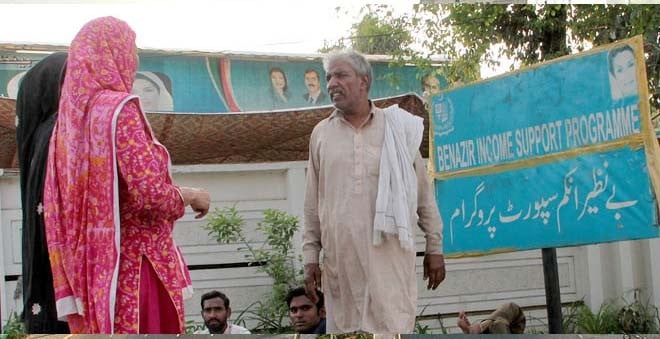

For Masi Hani, 50, mother of five who lives in a one-room house in village Talho Khan Bhurghi in district Badin, the Benazir Income Support Programme (BISP) is a blessing. "True, money coming through the programme has elevated my stature at home. But, more importantly, I have become a part of every decision made in the house, like decisions regarding marriages of daughters. The programme has changed my life altogether," says Hani.
Hani feels empowered, not only because she is a part of the decision-making process at home but also she voted for the first time in May 2013 and has a Computerised National Identity Cards (CNICs). "I am the only person in my family who has a bank account. I am also in the process of learning how to use an ATM," she says, adding, "There is only one woman in our village who knows how to use an ATM. She operates ATMs for us and charges Rs50 for the favour."
She says her husband would never allow her to get a CNIC if it would not have been a pre-requisite for registering for the BISP -- "I know dozens of women in my village who have got CNICs, bank accounts, ATM cards and mobile phones because of the BISP. Women now have confidence that they, too, can do something for the betterment of their family."
Masi Hani is one of the three million women coming from the poorest strata of the society which have benefited from the programme all over the country. The majority of beneficiaries (over 1.37 million) are from Punjab, followed by Sindh with 1.34 million beneficiaries. Majority of these women did not have CNICs. One of the prerequisites for qualifying for this cash transfer programme is the acquisition of CNIC. This procedural requirement is encouraging women to apply for CNICs, encouraging them to be more socially mobile and registering with national authorities.
Nadra officials say that after the launch of the BISP, the number of women applying for CNICs has increased to a greater extent. Since the presence of the applicant is mandatory for the issuance of CNIC, women are coming out of their homes, going to Nadra offices and getting their pictures taken. "Nadra had been facing problem in reaching out to the women in backward areas for registration before 2008. We used to send our mobile vans to backward areas of Sindh, South Punjab, KP and Balochistan and most people did not allow the women in their families to register. But after 2008, people in many of those areas started contacting Nadra to get CNICs for the women in their families. The BISP definitely played a positive role. We had around 20 million registered women with us in 2008 but the number has crossed 40 million now," says a Nadra official requesting anonymity.
A baseline study on the BISP shows that cash transfers to women have a positive effect on their empowerment and greater participation in household decision-making. The BISP uses payment mechanisms including debit and smart cards to efficiently make cash grant payments to the beneficiaries, enhancing their mobility and allowing them greater access to banking interfaces.
According to the BISP officials, by July 2013, over 3 million debit cards had been distributed to women and almost Rs34 billion disbursed to their accounts. Further, over 173,525 beneficiaries hold smart cards, with Rs2.2 billion disbursed to them. The study found that provision of the alternate payment mechanisms, backed by technology, have impacted the lives of the underprivileged women. They have been introduced to formal financial products and services. This is phenomenal as in Pakistan less than 65 per cent of adult population is using any formal financial product and services. Women are visiting ATMs and banks to receive their payments, and learning usage of new technologies.
In Pakistan only three per cent females have accounts with formal financial institutions as opposed to the 25 per cent regional average.
By December 2013, there were almost two million ‘level zero’ accounts, held by poor women beneficiaries of the BISP, providing them their first ever access to formal banking services as account holders in commercial banks. One such payment modality employed by the BISP for disbursement of cash is mobile payments. Women are issued mobile phones to receive notification via SMS when payment arrives in their accounts. Due to this payment modality, women have become owners of mobile phones for the first time in their lives.
Mustafa Baloch, an official of Strengthening Participatory Organisation (SPO), an NGO working on empowerment of women in Pakistan, says that the BISP has multiple effects on lives of recipients. "In interior Sindh, more than 50 per cent women have got their CNICs because of the BISP. Their status has not only been elevated in the families but also in the society. They have started taking part in the political process. You can see a greater number of women visiting banks and ATM machines," he says.
A rapid impact evaluation of BISP conducted by the World Bank in 2012 indicates that the BISP led to empowerment of the recipients, as compared to the non-recipient population. In summary, due to their inclusion in cash transfer programmes, women are gradually becoming part of daily activities in the public domain that were previously a taboo for them.